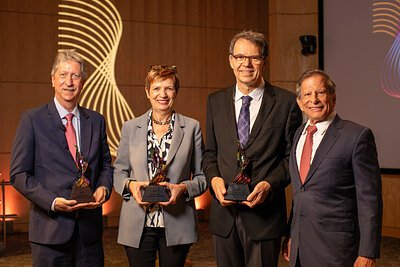
CAR T-Cell Therapy Pioneers Honored with Merkin Prize Amid Rising Costs & Expanding Applications
Breakthrough cancer treatment recognized for impact, but accessibility remains a concern as researchers explore potential beyond oncology. A look at the future of personalized medicine.
CAR T-Cell Therapy Pioneers Honored with Merkin Prize Amid Rising Costs & Expanding Applications
BOSTON, MA – October 31, 2025 – Carl June, Bruce Levine, Isabelle Rivière, and Michel Sadelain have been jointly awarded the prestigious 2025 Richard N. Merkin Prize in Biomedical Technology for their groundbreaking work in CAR T-cell therapy, a revolutionary approach to treating cancer. The $400,000 prize, administered by the Broad Institute and funded by the Merkin Family Foundation, recognizes the significant impact of their research on cancer treatment and the potential for this technology to address a broader range of diseases.
A Revolution in Cancer Treatment
CAR T-cell therapy, or Chimeric Antigen Receptor T-cell therapy, has transformed the landscape of cancer treatment, particularly for blood cancers like leukemia and lymphoma. The therapy involves genetically engineering a patient’s own T-cells – crucial components of the immune system – to recognize and attack cancer cells. While conventional cancer treatments often damage healthy cells alongside cancerous ones, CAR T-cell therapy offers a more targeted approach, harnessing the power of the patient’s immune system to fight the disease.
“This isn't just incremental progress; it's a paradigm shift,” said one expert in the field. “We’re seeing durable remissions in patients who had exhausted all other treatment options.” As of late 2024, over 34,000 patients globally have been treated with CAR T-cell therapy, with that number expected to rise significantly in the coming years. China has seen rapid adoption, treating over 5,000 patients within its public system by 2023, while North America currently leads in CAR T-cell therapy availability, with 85 centers providing the treatment.
The Price of Hope: Accessibility and Affordability Challenges
Despite its effectiveness, CAR T-cell therapy is extraordinarily expensive, typically ranging from $300,000 to $500,000 per treatment. This high cost presents a significant barrier to access, raising concerns about healthcare equity and the ability of patients, particularly those in lower-income countries, to benefit from this life-saving therapy. “The technology is incredible, but the price tag is simply unsustainable for many,” explained a patient advocate. “We're facing a situation where a potentially curative therapy is out of reach for those who need it most.”
Beyond the direct cost of the therapy, logistical challenges and infrastructure requirements further complicate access. CAR T-cell therapy requires specialized facilities, trained personnel, and a complex manufacturing process, limiting its availability to a relatively small number of centers worldwide. Furthermore, the therapy is not without risks. Patients may experience severe side effects, including cytokine release syndrome (CRS) and immune effector cell-associated neurotoxicity syndrome (ICANS), requiring intensive monitoring and management. Recently, the FDA launched an investigation into cases of secondary T-cell cancers occurring in patients previously treated with CAR T-cell therapies, highlighting the need for ongoing research into long-term safety.
Beyond Cancer: Expanding the Therapeutic Horizon
While currently approved for several blood cancers, researchers are actively exploring the potential of CAR T-cell therapy to treat a wider range of diseases. Ongoing research is focused on adapting the technology to target solid tumors, which pose unique challenges due to their complex microenvironment and ability to evade the immune system. “Solid tumors are a much tougher nut to crack,” explained a researcher. “We’re working on strategies to overcome the barriers that prevent CAR T-cells from effectively infiltrating and killing cancer cells within solid tumors.”
Beyond cancer, CAR T-cell therapy is also being investigated as a potential treatment for autoimmune diseases and infectious diseases. Researchers are exploring the possibility of engineering CAR T-cells to suppress the immune response in autoimmune diseases or to target and eliminate virus-infected cells. “The potential applications are vast,” said one expert. “We’re only beginning to scratch the surface of what CAR T-cell therapy can achieve.” Several companies and research institutions are actively developing “off-the-shelf” allogeneic CAR T-cells, derived from healthy donors, to reduce manufacturing time and cost, and improve accessibility. The market is currently projected to reach $61.1 billion by 2034, demonstrating substantial growth potential.
The Merkin Family Foundation’s commitment to supporting groundbreaking biomedical research, exemplified by the Richard N. Merkin Prize, is playing a critical role in accelerating the development and translation of these innovative therapies. Their partnership with the Broad Institute underscores their dedication to fostering collaboration and driving progress in the field of healthcare.
